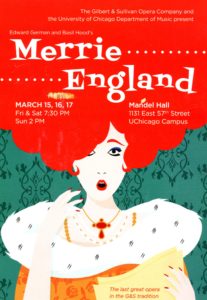The point of going to Hyde Park on Sunday wasn’t merely to tool around the neighborhood, though that’s usually fun, but to see the Gilbert & Sullivan Opera Company’s performance of Merrie England at Mandel Hall.
It was the fourth production of theirs we’ve seen, besides Patience (last year) Iolanthe (2017) and Yeomen of the Guard (2015). Seems like the company wanted to do something a little different this year. Like Gilbert & Sullivan, but not Gilbert & Sullivan.
 Composer Edward German and librettist Basil Hood collaborated on Merrie England, which had its first run in 1902. G&S might not have been working together by then — Sullivan especially, who had the handicap of being dead — but clearly German & Hood were giving the people what they wanted, for a little while longer anyway. I understand that it was among the last new light operas produced by the D’Oyly Carte Opera Company.
Composer Edward German and librettist Basil Hood collaborated on Merrie England, which had its first run in 1902. G&S might not have been working together by then — Sullivan especially, who had the handicap of being dead — but clearly German & Hood were giving the people what they wanted, for a little while longer anyway. I understand that it was among the last new light operas produced by the D’Oyly Carte Opera Company.
Merrie England has all the same sort of whimsy and nonsense as G&S, set to music and enlivened by dance as in G&S. Supposedly it takes place in the age of Elizabeth I, who makes an appearance, along with other historic figures like Sir Walter Raleigh and the Earl of Essex.
The show has all you need in this kind of comic opera: love declared, thwarted and finally triumphant; word play and a few patter songs; a little swordplay and some chasing around the stage; even a cameo by an actual corgi and a supporting character who unexpectedly breaks out a trombone and starts to play it.
All of the cast struck me as talented, but I particularly enjoyed the comic styling of Jeffrey Luksik as Wilkins, who says he’s “poet and chief player in Shakespeare’s Company” who, in a bit of meta fun, insists that everything is better when put to music.
“I prophesy that he [Shakespeare] hath a misconception of the part of a writer in writing a part, in that he hath too little regard for the matters of singing and dancing; for a time will come when all comedies shall be musical, or the public will have none of them…
Dost remember in ‘To be, or not to be’?
Come the words ‘a sea of trouble’
The applause, I trow, would double
If he forthwith sang a song about the sea!”
Dorian McCall did a fine turn as the Earl of Essex, the villain but not really the villain. As the program notes put it, he has an “even baritone and a rich and flexible voice, recognized as having great style, musically and physically, on stage.”
Also impressive: Emma Sorensen, who played a woodland-dwelling character called Jill-All-Alone, a witch but not really a witch, unless she really was a witch. How such a slender woman can project such a powerful voice is beyond me.
A fuller review — “hijinks and humor galore” is in the apt head — along with a picture of the cast, is at the Hyde Park Herald.